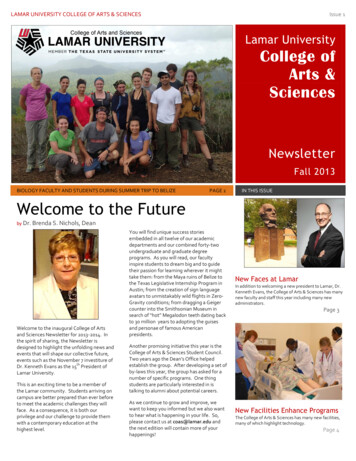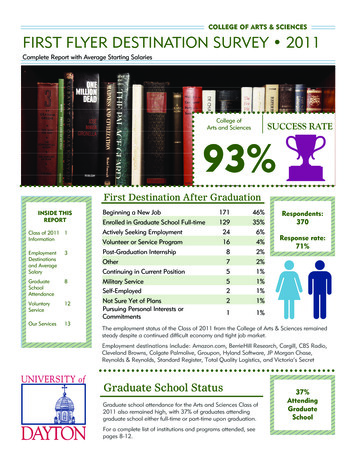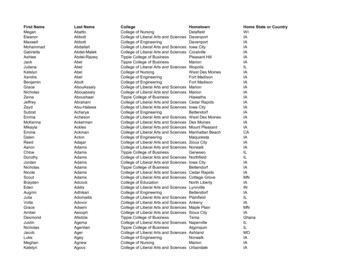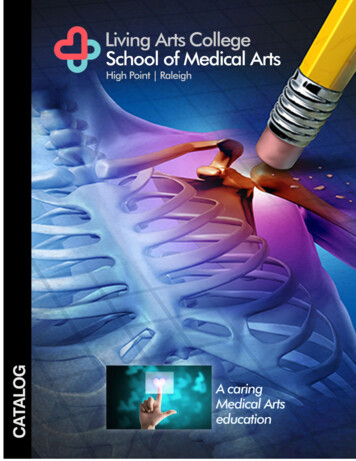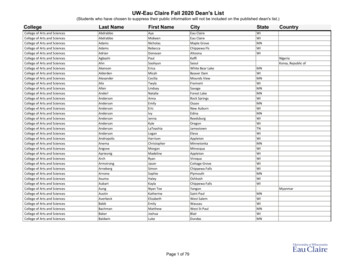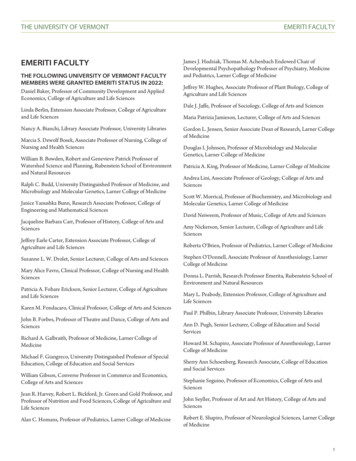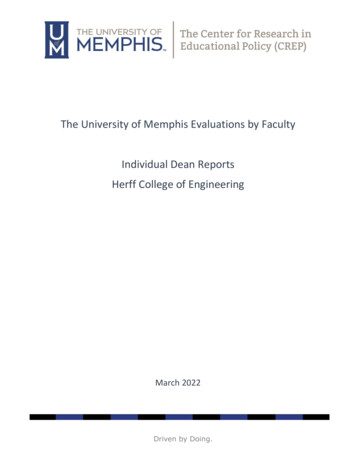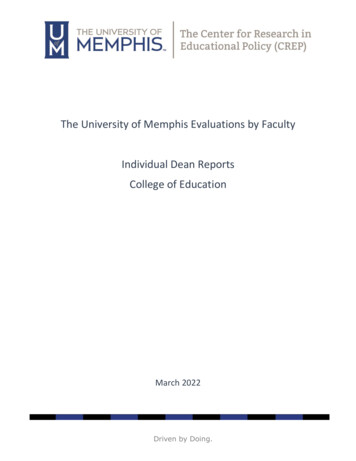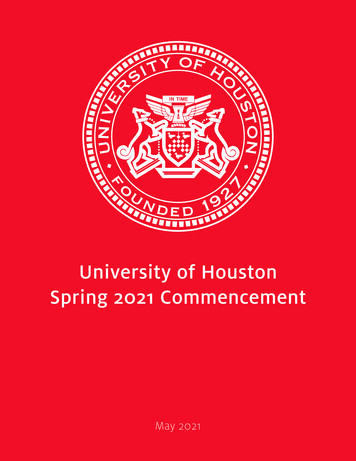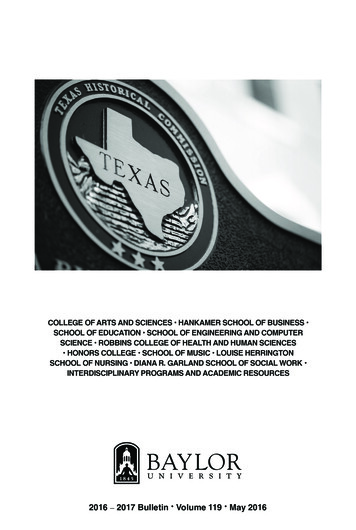
Transcription
COLLEGE OF ARTS AND SCIENCES HANKAMER SCHOOL OF BUSINESS SCHOOL OF EDUCATION SCHOOL OF ENGINEERING AND COMPUTERSCIENCE ROBBINS COLLEGE OF HEALTH AND HUMAN SCIENCES HONORS COLLEGE SCHOOL OF MUSIC LOUISE HERRINGTONSCHOOL OF NURSING DIANA R. GARLAND SCHOOL OF SOCIAL WORK INTERDISCIPLINARY PROGRAMS AND ACADEMIC RESOURCES2016 – 2017 Bulletin Volume 119 May 2016
PURPOSE OF THIS PUBLICATIONThis publication provides a description of those programs and activities of Baylor University whichare indicated in the title and text. It is not an offer to make a contract.The administration and faculty of Baylor University believe that the educational and other programsof Baylor University, including those described herein, are effective and valuable, and that they provideskills and/or understanding in keeping with the subject matter of the program.The ultimate results of programs offered, however, in terms of achievement, employment, professionallicensing, or other measure, are also dependent on factors outside the programs, such as the personalityand energy of the students, governmental or institutional regulations, and market conditions. Therefore,except as specifically stated herein, Baylor University makes no representation or contract that followinga particular course or curriculum will result in specific achievement, employment or qualification foremployment, admission to degree programs, or licensing for particular professions or occupations.It is sometimes necessary or appropriate to change the programs offered. Baylor University retainsthe right to terminate or change any and all aspects of its educational and other programs at any timewithout prior notice.NOTICE OF NONDISCRIMINATORY POLICYBaylor University complies with all applicable federal and state nondiscrimination laws, and doesnot engage in prohibited discrimination on the basis of race, color, nationality or ethnic origin, gender,age, or disability in either employment or the provision of services. The University is governed by apredominantly Baptist Board of Regents and is operated within the Christian-oriented aims and ideals ofBaptists. Baylor is also affiliated with the Baptist General Convention of Texas, a cooperative associationof autonomous Texas Baptist churches. As a religiously-controlled institution of higher education, BaylorUniversity is exempted from compliance with some provisions of certain civil rights laws, includingsome provisions of Title IX of the Education Amendments of 1972.EQUAL ACCESS TO UNIVERSITY EDUCATIONAL PROGRAMSBaylor University provides equal access to all University educational programs to every qualifiedstudent. However, if any student requires special personal services or equipment, the student will beresponsible for the expenses thereof. This policy includes the expense of providing personal tutors,personal attendants, medical technicians, and so forth. The Office of Access and Learning Accommodationwill assist such student in communicating with the proper community or governmental agency to secureany available financial assistance to meet his or her needs.DIRECTORY INFORMATIONDirectory information is that information that is customarily made public without the written consentof the student. However, under the provisions of the Family Educational Rights and Privacy Act of 1974,a student may ask Baylor University not to disclose directory information by making written notice tothe Office of the Registrar. Requests for nondisclosure will be honored by the University until notified inwriting that information should no longer be withheld. Directory information includes: name, address,telephone number, e-mail address, dates of attendance, level and classification, University ID cardphotograph, previous institution(s) attended, major field of study, awards, scholarships, honors,degree(s) conferred and date(s), full-time/part-time status, earned hours, expected graduation dateor degree candidacy, thesis and dissertation titles and advisors, past and present participation inofficially recognized sports and activities, physical factors of athletes (age, height, weight), anddate and place of birth.STUDENT AID INFORMATIONFinancial aid programs available to undergraduate students include academic and need-basedscholarships, grants, Federal Work-Study, federal educational loans, and alternative loans through variousprivate lenders. Students interested in consideration for financial aid should complete the Free Applicationfor Federal Student Aid (FAFSA) online at www.fafsa.gov. Visit the Student Financial Aid Office websiteat www.baylor.edu/sfs for additional information regarding the financial aid application process.The provisions of this catalog do not constitute a contract, expressed or implied, between BaylorUniversity and any applicant, student, student’s family, faculty, or staff member. Baylor Universityreserves the right to withdraw courses at any time, or change fees, tuition, rules, calendar, curricula,degree programs, degree requirements, graduation procedures, and any other requirement affectingstudents. Changes will become effective at the time the proper authorities so determine, and the changeswill apply to both prospective students and those already enrolled. This catalog is a general informationpublication only, and it is not intended to, nor does it contain all regulations that relate to students.
TABLE OF CONTENTSGeneral Information . 2Mission Statement of Baylor University . 4Historical Highlights of Baylor University . 5Board of Regents . 6Administration. 7Accreditations and Memberships. 8Academic Calendar. 10Admissions . 14Credit by Examination. 17Advanced Placement in Foreign Language. 17National and International Scholarships. 17Student Financial Aid. 19Financial Costs. 20Cancellations, Drops, and University Withdrawals. 22General University Regulations. 24Registration and Course Load. 26Curriculum Organization. 30Examinations. 31Grading Policies. 31Deans’ Academic Honor List. 33Graduation with Latin Honors. 33Academic Actions and Student Success. 34Degree Requirements. 36Other Requirements for Graduation. 37College of Arts and Sciences. 39Hankamer School of Business. 131School of Education. 179School of Engineering and Computer Science . 201Robbins College of Health and Human Sciences. 227Louise Herrington School of Nursing. 259Honors College. 279School of Music. 303School of Social Work. 327Interdisciplinary Programs and Academic Resources. 337Courses of Instruction. 351Faculty. 648Index. 691
4BAYLOR UNIVERSITYMISSION STATEMENTThe mission of Baylor University is to educate men and women for worldwide leadership andservice by integrating academic excellence and Christian commitment within a caring community.Chartered in 1845 by the Republic of Texas and affiliated with the Baptist General Conventionof Texas, Baylor is both the state’s oldest institution of higher learning and the world’s largestBaptist university. Established to be a servant of the church and of society, Baylor seeks to fulfillits calling through excellence in teaching and research, in scholarship and publication, and inservice to the community, both local and global. The vision of its founders and the ongoingcommitment of generations of students and scholars are reflected in the motto inscribed on theBaylor seal: Pro Ecclesia, Pro Texana – For Church, For Texas.Pro Ecclesia. Baylor is founded on the belief that God’s nature is made known throughboth revealed and discovered truth. Thus, the University derives its understanding of God,humanity, and nature from many sources: the person and work of Jesus Christ, the biblicalrecord, and Christian history and tradition, as well as scholarly and artistic endeavors. In itsservice to the church, Baylor’s pursuit of knowledge is strengthened by the conviction that truthhas its ultimate source in God and by a Baptist heritage that champions religious liberty andfreedom of conscience. Without imposing religious conformity, Baylor expects the members ofits community to support its mission. Affirming the value of intellectually informed faith andreligiously informed education, the University seeks to provide an environment that fostersspiritual maturity, strength of character, and moral virtue.Pro Texana. Integral to its commitment to God and to the church is Baylor’s commitmentto society. Whereas that society in the mid 1800s was limited to Texas, today Baylor’s sphere ofinfluence is indeed the world. The University remains dedicated to the traditional responsibilitiesof higher education – dissemination of knowledge, transmission of culture, search for newknowledge, and application of knowledge – while recognizing the global proportions theseresponsibilities have assumed. Moreover, within the context of an ethnically and culturallydiverse community, Baylor strives to develop responsible citizens, educated leaders, dedicatedscholars, and skilled professionals who are sensitive to the needs of a pluralistic society. To thoseends, Baylor provides expanded opportunities for civic education and for church and communityservice at home and abroad.Pro Ecclesia, Pro Texana. Baylor University is committed to excellence at the undergraduate,graduate, and professional levels. Within the undergraduate programs, the University seeks tofamiliarize students with the principal bodies of knowledge, cultural viewpoints, belief systems,and aesthetic perspectives that affect the world in which they live. Within the graduate and theprofessional programs, the University provides advanced educational opportunities to developethical and capable scholars and practitioners who contribute to their academic disciplines,professional fields, and society. Baylor encourages all of its students to cultivate their capacityto think critically, to assess information from a Christian perspective, to arrive at informed andreasoned conclusions, and to become lifelong learners. Beyond the intellectual life, the Universitypursues the social, physical, ethical, and spiritual development of each student.Aware of its responsibility as the largest Baptist educational institution in the world andas a member of the international community of higher learning, Baylor promotes exemplaryteaching, encourages innovative and original research, and supports professional excellencein various specialized disciplines. Advancing the frontiers of knowledge while cultivating aChristian world-view, Baylor holds fast to its original commitment – to build a university thatis Pro Ecclesia, Pro Texana.
HISTORICAL HIGHLIGHTS OF BAYLOR UNIVERSITY5Baylor University was founded under the leadership of Judge R.E.B. Baylor, Reverend JamesHuckins, and Reverend William Milton Tryon, three farsighted pioneer missionaries working throughthe Texas Baptist Education Society. They, along with other associations, sent representatives in 1848to create the Baptist State Association, which later became the Baptist State Convention.1845—Baylor chartered on February 1 by the Republic of Texas.1849—Instruction in law began.1857—School of Law organized.1883—School of Law closed.1920—School of Law reorganized.1886—Baylor merged with Waco University and moved to Waco.1903—College of Medicine organized in Dallas by assuming responsibility for operations of theUniversity of Dallas Medical Department.1943—Moved to Houston.1969—Given independent status.1903—College of Pharmacy organized in Dallas.1930—College of Pharmacy terminated.1905—Theological Seminary organized in Waco.1907—Separated from Baylor University.1910—Moved to Fort Worth.1918—College of Dentistry organized in Dallas by taking over the State Dental College, foundedin 1905.1971—The College was separately incorporated in 1971, although Graduate programscontinued to be offered through Baylor University.1996—The College became a part of the Texas A&M System on September 1.1919—Baylor Hospital organized in Dallas, now Baylor University Medical Center.1919—College of Arts and Sciences organized.1919—College of Fine Arts organized, which consisted of offerings in music and in expression.1921—Terminated in favor of the present School of Music.1919—School of Education organized.1921—Training School of the Texas Baptist Memorial Sanitarium, originally organized as adiploma-granting program in 1909, incorporated into Baylor University as BaylorHospital School of Nursing.1950—The School of Nursing reorganized as an academic unit of Baylor Universityoffering a Bachelor of Science in Nursing degree.2000—Renamed Louise Herrington School of Nursing in honor of Louise HerringtonOrnelas.1921—School of Music organized.1923—School of Business organized.1959—Renamed Hankamer School of Business in honor of Mr. and Mrs. EarlHankamer of Houston.1947—Graduate School organized.Graduate study and degrees have been offered since 1894.1951—Graduate program in hospital administration established in conjunction with the ArmyMedical Field Service School, Fort Sam Houston.1971—Graduate program in physical therapy added at Fort Sam Houston.1971—Program in physician’s assistant added in collaboration with the Army MedicalField Service School, Fort Sam Houston; terminated in 1977.1972—Army Medical Field Service School renamed Academy of Health Sciences ofthe U.S. Army.1973—Baylor University Memorandum of Agreement with the U.S. Army Academy ofHealth Sciences affiliated over 20 programs of instruction with 150 course offeringsfor academic credit at Baylor University; terminated in 1977 for all programs exceptHealth Care Administration and Physical Therapy.1987—University School organized. Responsibilities reassigned to other academic units in 1992.1993—George W. Truett Theological Seminary organized in Waco.1994—Seminary classes began.1995—School of Engineering and Computer Science organized.2002—Honors College organized.2005—School of Social Work granted independent status from the College of Arts and Sciences.2014—Robbins College of Health and Human Services organized.GENERAL INFORMATIONUNDERGRADUATE CATALOG / General Information
6BAYLOR UNIVERSITYBOARD OF REGENTSJoel T. AllisonMiles Jay AllisonRobert “Bob” E. BeauchampLinda BrianKenneth “Ken” Q. CarlileJerry K. ClementsJennifer Walker ElrodShelley GiglioJames Cary GrayDavid H. HarperLarry P. HeardMilton HixsonW.D. “Dan” Hord IIIChristopher B. HowardMark HurdNeal JeffreyMark E. LovvornMark A. McCollumRonald D. MurffRandolph “Randy” L. PullinJeff D. ReeterWilliam K. Robbins, Jr.C. Clifton RobinsonWilliam “Bill” S. SimonKim StevensPhilip W. StewartDennis Ray WilesRichard S WillisRonald L. WilsonKathy Wills WrightEX OFFICIO REGENTSLori E. BakerDebra “Debbie” Bradley MannChristopher P. ManningJonathan SiktbergREGENTS EMERITIGeorge C. AnsonSue Holt GettermanDrayton McLane, Jr.Regents as of May 1, 2016
7ADMINISTRATIONGeneral AdministrationKenneth Winston Starr, B.A., M.A., J.D. . President and ChancellorJuan Alejandro, Jr., B.B.A., M.B.A., Ed.D. Vice President and Chief Compliance OfficerDavid P. Rosselli, B.A., M.A.Vice President and Chief Marketing OfficerCharles D. Beckenhauer, B.A., J.D. . General Counselor and Chief Legal OfficerTommye Lou Davis, B.A., M.S.Ed.Vice President for Constinuent Engagement andChief of Staff to the PresidentKevin P. Jackson, B.A., M.A., Ph.D. .Vice President for Student LifeL. Gregory Jones, B.A., M.P.A., M.Div., Ph.D.Executive Vice President and ProvostIan McCaw, B.Comm., M.S. . Vice President and Athletics DirectorBrian Nicholson, B.S., M.B.A.Vice President for Operations and Facilities ManagementPattie Orr, B.S., M.Ed. .Vice President for Information TechnologyReagan M. Ramsower, B.B.A., M.S., Ph.D. .Senior Vice President for Operations,Finance and AdministrationBrian Webb, B.B.A., M.B.A.,.Vice President and Chief Investment OfficerAcademic OfficersShelley Conroy, R.N., M.S., Ed.D.Dean, Louise Herrington School of Nursing andInaugural Dean, Robbins College of Health and Human SciencesMichael K. McLendon, B.A., M.S., Ph.D. Dean, School of EducationTodd D. Still, B.A., M.Div., Ph.D.Dean, George W. TruettTheological SeminaryJon Singletary, B.A., M.Div., M.S.W., Ph.D. Interim Dean, School of Social WorkThomas S. Hibbs, B.A., M.A., M.M.S., Ph.D.Dean, Honors CollegeDennis L. O'Neal, B.S., M.S., Ph.D. .Dean, School of Engineering and Computer ScienceJ. Larry Lyon, B.A., M.A., Ph.D. . Dean, Graduate SchoolTerry S. Maness, B.A., M.S., D.B.A. .Dean, Hankamer School of BusinessGary Mortensen, B.M.E., M.M., D.M.A.Dean, School of MusicLee C. Nordt, B.S., M.S., Ph.D. .Dean, College of Arts and SciencesPattie Orr, B.S., M.Ed.Dean, University LibrariesBradley J.B. Toben, B.A., J.D., LL.M.Dean, School of LawEnrollment Management OfficersJennifer Carron, B.A.Assistant Vice President, Enrollment ManagementSinda Vanderpool, B.A., M.A., Ph.D.Associate Vice Provost for AcademicEnrollment ManagementStudent Life OfficersBurt Burleson, B.A., M.Div., D.Min. . University ChaplainElizabeth D. Palacios, B.A., M.S.Ed., Ph.D.Dean for Student DevelopmentMartha Lou Scott, B.S., M.P.A., Ed.D. . Associate Vice President for Student LifeJeff Doyle, B.A., M.Ed., Ph.D. Dean for Student Learning and EngagementCampus SafetyBrad Wigtil, B.A., M.S. Chief of PoliceGENERAL INFORMATIONUNDERGRADUATE CATALOG / General Information
8BAYLOR UNIVERSITYACCREDITATIONS AND MEMBERSHIPSBaylor University consists of 12 colleges and schools located in Waco, Dallas, and San Antonio.Baylor University is accredited by the Southern Association of Colleges and Schools Commissionon Colleges to award bachelor’s, master’s, specialist, and doctor’s degrees. Individuals who wish tocontact the Commission on Colleges pertaining to the accreditation status of the University may writethe Commission at 1866 Southern Lane, Decatur Georgia 30033-4097, or call at (404) 679-4501. Inaddition, the University and its schools and departments are accredited by, and/or hold membershipin, the following organizations:GeneralThe Association of Texas Colleges and UniversitiesThe Association of American Colleges and UniversitiesThe American Council on EducationThe Southern University ConferenceThe American Council of Learned SocietiesThe Texas Council of Church-Related CollegesThe Association of Southern Baptist Colleges and SchoolsThe Lilly Fellows National Network of Church-Related Colleges and UniversitiesThe American Association of University WomenThe American Society of Allied Health ProfessionsCollege and SchoolsCollege of Arts and SciencesCouncil of Colleges of Arts and SciencesPhi Beta KappaHankamer School of BusinessAACSB International – The Association to Advance Collegiate Schools of BusinessBeta Gamma SigmaSchool of EducationThe American Association of Colleges for Teacher EducationCouncil for the Accreditation of Educator PreparationProgram Accreditation by the State Board for Educator CertificationKappa Delta PiSchool of Engineering and Computer ScienceComputer Science: B.S.C.S. degree accredited by the Computing Accreditation Commission(CAC) of the Accreditation Board for Engineering and Technology (ABET)Engineering: Electrical and Computer Engineering, Engineering, and Mechanical Engineeringprograms accredited by the Engineering Accreditation Commission (EAC) of the AccreditationBoard for Engineering and Technology (ABET)Graduate SchoolThe Council of Graduate SchoolsThe Association of Texas Graduate SchoolsThe Conference of Southern Graduate SchoolsThe Midwestern Association of Graduate SchoolsRobbins College of Health and Human SciencesSociety for Public Health Education-American Association for Health EducationSchool of LawThe Association of American Law SchoolsAccredited by the American Bar AssociationSchool of MusicThe National Association of Schools of MusicThe Texas Association of Music Schools
9Pi Kappa LambdaLouise Herrington School of NursingAccredited by the Commission on Collegiate Nursing Education and the Texas State Boardof Nurse ExaminersThe Southern Regional Education Board, Council on Collegiate Education for NursingThe American Association of Colleges of NursingSchool of Social WorkCouncil on Social Work EducationGeorge W. Truett Theological SeminaryThe Association of Theological SchoolsDepartments and ProgramsAmerican Mathematical SocietyAmerican Studies: Member, The American Studies Association and The American StudiesAssociation of TexasArt: Texas Association of Schools of ArtAthletic Training: Commission on Accreditation of Athletic Training EducationAviation Sciences: Member, The University Aviation AssociationChemistry: Approved by the American Chemical SocietyChild and Family Studies accredited by the National Association for the Education of YoungChildrenCommunication Sciences and Disorders: Accredited by the Council on Academic Accreditationin Audiology and Speech-Language Pathology of the American Speech-Language-HearingAssociationCommunity Health: SABPAC (SOPHE-AAHE Baccalaureate Program Approval Committee)Environmental Health Science: Association of Environmental Health Academic Programs (AEHAP)Bachelor of Science in Environmental Health Science is accredited by The National EnvironmentalHealth Science and Protection Accreditation Council (EHAC).Graduate Program in Health Care Administration: Approved by the Accrediting Commission onEducation for Health Services AdministrationInterior Design: Accredited by the Council for Interior Design AccreditationJournalism, Public Relations and New Media: Accredited by the Accrediting Council on Educationin Journalism and Mass CommunicationGraduate Program in Physical Therapy: Accredited by the Commission on Accreditation in PhysicalTherapy Education of the American Physical Therapy AssociationMathematical Association of AmericaMathematical Sciences Research InstituteModern Languages and Cultures: Member, Association of Departments of Foreign Languages;Modern Language Association and South Central Modern Language AssociationNutrition Sciences: Accredited by the Accreditation Council for Education in Nutrition and DieteticsPolitical Science: American Political Science AssociationPsychology: Program in Clinical Psychology (Psy.D. Degree) accredited by American PsychologicalAssociationReligion: Baptist History and Heritage; Hispanic Theological Initiative Consortium; NationalAssociation of Bapatist Professors of Religion (NABPR); Southwest Commission on ReligiousStudiesTheatre Arts: National Association of Schools of TheaterGENERAL INFORMATIONUNDERGRADUATE CATALOG / General Information
10BAYLOR UNIVERSITY2016 – 2017 ACADEMIC CALENDARFall 2016/Spring 2017SUMMER SEMESTER 2016Invoice and Graduation — SummerMay2 — Summer Financial Settlement begins. View E-Bill and make payment onlineat www.baylor.edu/ebill. Students confirm attendance and check financialsettlement online at www.baylor.edu/bearweb.13 — Summer invoice payment and confirmation due date. (Summer Session I &II, Minimester and Full Summer Session). Cancellation date for any studentwho has a Minimester course in their schedule.28 — Deadline for summer Financial Settlement. Students that registered prior toMay 26 for either Summer Session I, II, or Full Summer Session must payand confirm attendance by 5 p.m. to prevent class cancellation. If allowedto re-register after cancellation, a 100 re-registration fee will be assessed.June1 — Last day for graduating seniors to file for August graduation with the respectivedeans.30 — Deadline for Financial Settlement for those registered for Session II onlyafter May 25. Classes will be cancelled if not settled by 5 p.m. If allowed tore-register a 100 re-registration fee will be assessed.July29 — Correspondence courses must be completed by this date for August graduation.29 — Incomplete courses must be completed by this date for credit for Augustgraduation.August11-12 — Administrative check on candidates for graduation.14 — Truett Seminary Commencement13 — Commencement, Ferrell Center, 9:30 a.m.14 — Residence halls close at 2:00 p.m. for summer graduating seniors.Minimester — May 11 - 27May10 — Last day to register for Minimester through BearWeb.13 — Residence halls open at 1:00 p.m. for May Minimester.11 — Class sessions begin for Minimester.12 — Students that withdraw from the University for the Minimester session afterthis date will receive a notation of W (Withdrawal) on their transcript in allclasses (through May 20).12 — Classes dropped after this date for the Minimester session will be recordedas a W (Withdrawal) on the transcript (through May 20).14 — Last day to drop a class without advisor approval.20 — Last day on which a student may drop a class for the Minimester session.20 — Last day on which a student may withdraw from the University for theMinimest
1921—Training School of the Texas Baptist Memorial Sanitarium, originally organized as a diploma-granting program in 1909, incorporated into Baylor University as Baylor Hospital School of Nursing. 1950—The School of Nursing reorganized as an academic unit of Baylor University offering a Bachelor of Science in Nursing degree.

